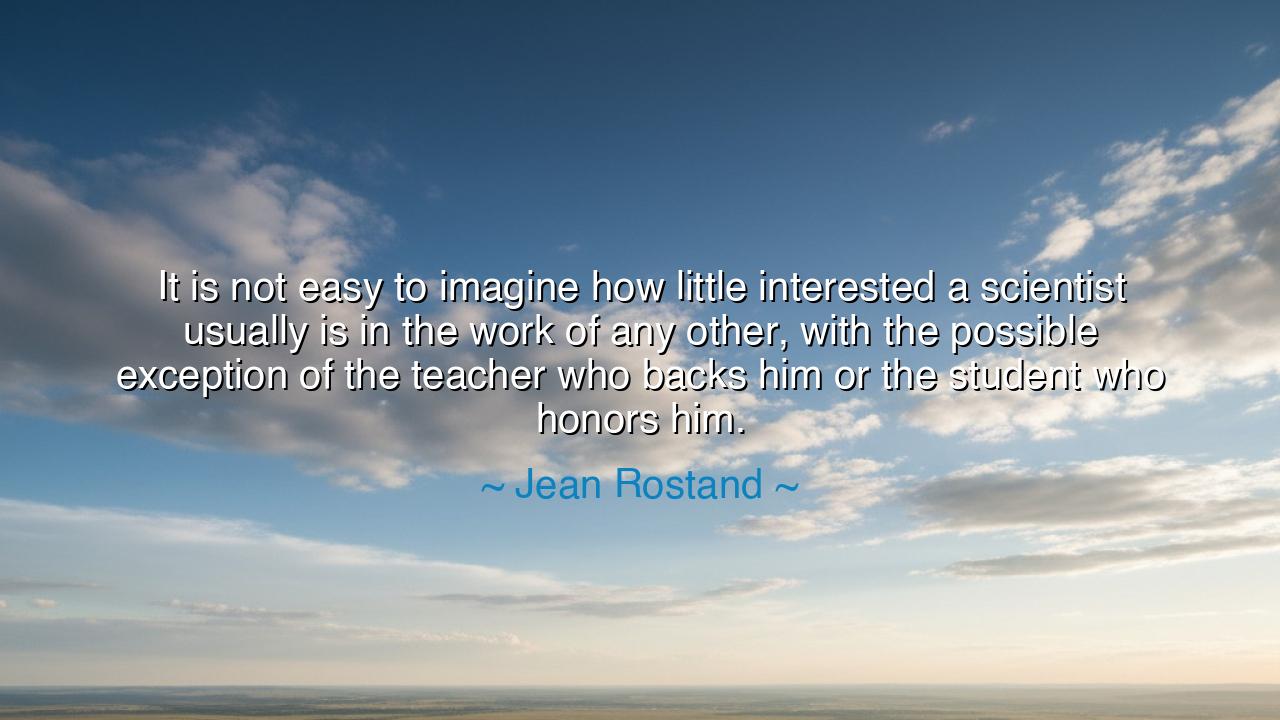
It is not easy to imagine how little interested a scientist
It is not easy to imagine how little interested a scientist usually is in the work of any other, with the possible exception of the teacher who backs him or the student who honors him.






Hear the words of Jean Rostand, biologist and thinker, who declared: “It is not easy to imagine how little interested a scientist usually is in the work of any other, with the possible exception of the teacher who backs him or the student who honors him.” In this statement lies a paradox of the human mind: that even those who dedicate their lives to truth often labor in solitude, their gaze turned inward, more concerned with their own path than with the discoveries of their fellows. Rostand unveils the hidden truth of intellectual pursuit: that pride, ambition, and the personal bond between teacher and student often outweigh the wider fellowship of knowledge.
To say that a scientist is little interested in the work of another is to reveal both a weakness and a strength. The weakness is clear: indifference can blind one to the wisdom of peers, cutting off the exchange that might enrich both sides. But the strength lies in focus: by pressing on with singular devotion, the scientist may uncover what others, distracted by too many voices, might miss. Yet Rostand adds the exception that saves the heart of science: the bond of mentorship. For the scientist is stirred not by rivalry, but by loyalty to the one who backed him in youth, or by pride in the one who, as student, carries forward his flame.
This truth echoes through history. Consider the story of Socrates, Plato, and Aristotle. Socrates cared little for the writings of others; his gaze was fixed upon his own inquiries, his own dialogues. Plato, in turn, built his Academy not as a place to debate the works of rivals, but to extend the teaching of his master. Aristotle, though diverging from Plato, remained marked by that bond of teacher and student. Each gave less attention to competing schools than to the lineage of thought that bound them together. Rostand’s words reveal this eternal pattern: that knowledge often grows along chains of mentorship, rather than through universal fellowship.
So too in the world of science. When Isaac Newton declared, “If I have seen further, it is by standing on the shoulders of giants,” he pointed not to all men equally, but to those few predecessors whose work formed his path. Newton was not deeply interested in every thinker of his time, nor in every rival’s work; he was consumed by his own vision. Yet his respect for Kepler, Galileo, and Descartes shows the same exception Rostand describes: gratitude to those who came before and pride in extending their legacy.
The deeper meaning of Rostand’s observation is a reflection on human nature. Even in the realm of science, which seeks universality, the passions of men—loyalty, pride, rivalry—still rule. A man is not stirred by every voice, but by the few voices that shape him most deeply. The teacher who nurtured him becomes a symbol of faith; the student who honors him becomes a symbol of legacy. These bonds are not distractions from science—they are the very human soil in which science grows.
The lesson, then, is twofold. First, recognize the power of mentorship, for it binds generations together more deeply than rivalry ever could. Teachers, know that your support may ignite the fire of discovery in a student who will carry your work forward. Students, honor your teachers, for in doing so you become part of an eternal chain of wisdom. Second, guard yourself against indifference to the work of others. While loyalty to one’s circle is natural, true greatness lies also in opening one’s heart to the wider fellowship of seekers.
So I say to you: remember Rostand’s wisdom. Knowledge grows not in isolation but in connection, and though pride narrows the gaze, gratitude and honor expand it. Be a scientist, yes, but also be a student who honors, and a teacher who backs. For in these sacred bonds lies the true continuity of wisdom, and the torch of discovery passes not through rivalry, but through the hands of those bound by respect and love.






AAdministratorAdministrator
Welcome, honored guests. Please leave a comment, we will respond soon